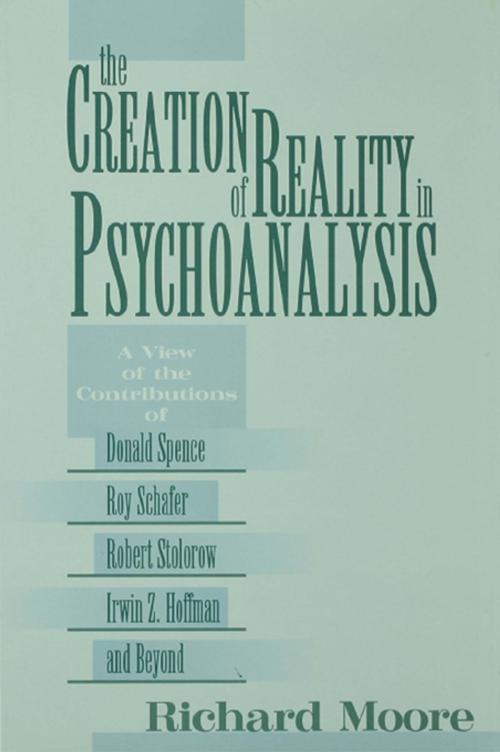The Creation of Reality in Psychoanalysis
A View of the Contributions of Donald Spence, Roy Schafer, Robert Stolorow, Irwin Z. Hoffman, and Beyond
Nonfiction, Health & Well Being, Psychology, Applied Psychology, Psychotherapy, Interpersonal Relations| Author: | Richard Moore | ISBN: | 9781134901531 |
| Publisher: | Taylor and Francis | Publication: | June 17, 2013 |
| Imprint: | Routledge | Language: | English |
| Author: | Richard Moore |
| ISBN: | 9781134901531 |
| Publisher: | Taylor and Francis |
| Publication: | June 17, 2013 |
| Imprint: | Routledge |
| Language: | English |
It has become almost de rigueur in contemporary psychoanalysis to cite Freud's positivism-especially his commitment to an objective reality that can be accessed through memory and interpretation-as a continuing source of weakness in bringing the field into the postmodern era. But is it so simple to move beyond Freud and objectivism in general? Or is it the case that even the most astute recent theorizing aimed at this move-and guided by therapeutic sensitivity and a concern with epistemic rigor-still betrays a lingering commitment to objective reality?
This is the intellectually exciting and exacting question that Richard Moore poses to his reader-and to the texts of four of the most influential psychoanalytic theorists on the scene today: Donald Spence, Roy Schafer, Robert Stolorow, and Irwin Z. Hoffman. Written with concentration and grace, The Creation of Reality in Psychoanalysis begins with the ambiguities in Freud's founding commitment to a recoverable, objectively verifiable reality before examining the ghost of objectivism that confounds, in surprising and unexpected ways, Spence's, Schafer's, Stolorow's, and Hoffman's recent attempts to move toward narrativist and constructivist views of the analytic encounter.
Following his penetrating survey of the contributions of these four major architects of contemporary psychoanalysis, Moore provides a glimpse of what an internally consistent postmodern metapsychology would actually look like. He approaches this task by exploring how our understanding of basic analytic concepts may ultimately be reconciled with the view that the creation of reality is an intrinsic aspect of any therapeutic encounter. Elegantly conceived and beautifully argued, this book guides the reader through the labyrinth of contemporary theory while holding fast to a critical stance toward its overarching goal: the elaboration of a truly thoroughgoing constructivism that is both therapeutically consequential and intellectually defensible.
It has become almost de rigueur in contemporary psychoanalysis to cite Freud's positivism-especially his commitment to an objective reality that can be accessed through memory and interpretation-as a continuing source of weakness in bringing the field into the postmodern era. But is it so simple to move beyond Freud and objectivism in general? Or is it the case that even the most astute recent theorizing aimed at this move-and guided by therapeutic sensitivity and a concern with epistemic rigor-still betrays a lingering commitment to objective reality?
This is the intellectually exciting and exacting question that Richard Moore poses to his reader-and to the texts of four of the most influential psychoanalytic theorists on the scene today: Donald Spence, Roy Schafer, Robert Stolorow, and Irwin Z. Hoffman. Written with concentration and grace, The Creation of Reality in Psychoanalysis begins with the ambiguities in Freud's founding commitment to a recoverable, objectively verifiable reality before examining the ghost of objectivism that confounds, in surprising and unexpected ways, Spence's, Schafer's, Stolorow's, and Hoffman's recent attempts to move toward narrativist and constructivist views of the analytic encounter.
Following his penetrating survey of the contributions of these four major architects of contemporary psychoanalysis, Moore provides a glimpse of what an internally consistent postmodern metapsychology would actually look like. He approaches this task by exploring how our understanding of basic analytic concepts may ultimately be reconciled with the view that the creation of reality is an intrinsic aspect of any therapeutic encounter. Elegantly conceived and beautifully argued, this book guides the reader through the labyrinth of contemporary theory while holding fast to a critical stance toward its overarching goal: the elaboration of a truly thoroughgoing constructivism that is both therapeutically consequential and intellectually defensible.















